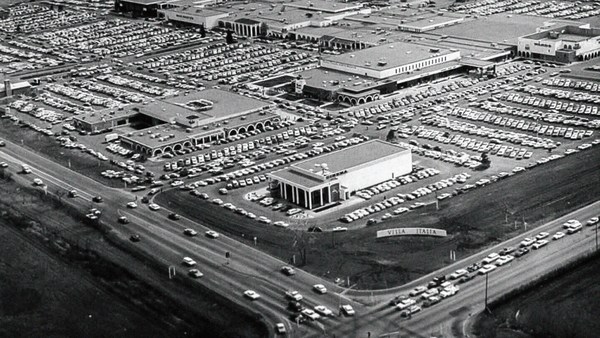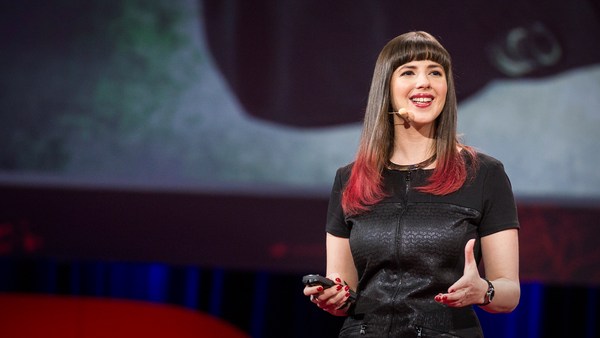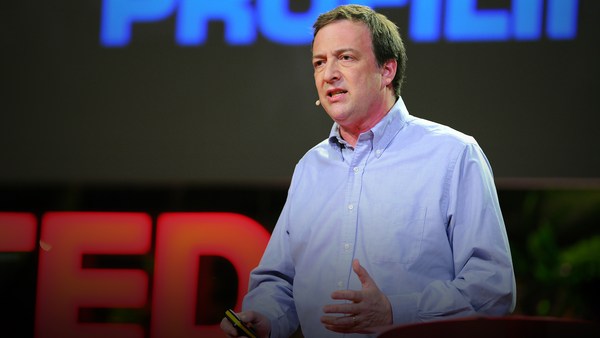I'm going to talk about hackers. And the image that comes to your mind when I say that word is probably not of Benjamin Franklin, but I'm going to explain to you why it should be.
The image that comes to your mind is probably more likely of a pasty kid sitting in a basement doing something mischievous, or of a shady criminal who is trying to steal your identity, or of an international rogue with a political agenda. And mainstream culture has kind of fed this idea that hackers are people that we should be afraid of.
But like most things in technology and the technology world, hacking has equal power for good as it has for evil. For every hacker that's trying to steal your identity there's one that's building a tool that will help you find your loved ones after a disaster or to monitor environmental quality after an oil spill. Hacking is really just any amateur innovation on an existing system, and it is a deeply democratic activity. It's about critical thinking. It's about questioning existing ways of doing things. It's the idea that if you see a problem, you work to fix it, and not just complain about it. And in many ways, hacking is what built America. Betsy Ross was a hacker. The Underground Railroad was a brilliant hack. And from the Wright brothers to Steve Jobs, hacking has always been at the foundation of American democracy.
So if there's one thing I want to leave you here with today, it's that the next time you think about who a hacker is, you think not of this guy but of this guy, Benjamin Franklin, who was one of the greatest hackers of all time. He was one of America's most prolific inventors, though he famously never filed a patent, because he thought that all human knowledge should be freely available. He brought us bifocals and the lightning rod, and of course there was his collaboration on the invention of American democracy.
And in Code For America, we really try to embody the spirit of Ben Franklin. He was a tinkerer and a statesman whose conception of citizenship was always predicated on action. He believed that government could be built by the people, and we call those people civic hackers.
So it's no wonder that the values that underly a healthy democracy, like collaboration and empowerment and participation and enterprise, are the same values that underly the Internet. And so it's no surprise that many hackers are turning their attention to the problem of government.
But before I give you a few examples of what civic hacking looks like, I want to make clear that you don't have to be a programmer to be a civic hacker. You just have to believe that you can bring a 21st-century tool set to bear on the problems that government faces. And we hear all the time from our community of civic hackers at Code for America that they didn't understand how much nontechnical work actually went into civic hacking projects. So keep that in mind. All of you are potential civic hackers.
So what does civic hacking look like? Our team last year in Honolulu, which in this case was three full-time fellows who were doing a year of public service, were asked by the city to rebuild the website. And it's a massive thing of tens of thousands of pages which just wasn't going to be possible in the few months that they had. So instead, they decided to build a parallel site that better conformed to how citizens actually want to interact with information on a city website. They're looking for answers to questions, and they want to take action when they're done, which is really hard to do from a site that looks like this. So our team built Honolulu Answers, which is a super-simple search interface where you enter a search term or a question and get back plain language answers that drive a user towards action. Now the site itself was easy enough to build, but the team was faced with the challenge of how they populate all of the content. It would have taken the three of them a very long time, especially given that none of them are actually from Honolulu. And so they did something that's really radical, when you think about how government is used to working. They asked citizens to write the content. So you've heard of a hack-a-thon. They held a write-a-thon, where on one Saturday afternoon -- ("What do I do about wild pigs being a nuisance?") (Laughter) — Wild pigs are a huge problem in Honolulu, apparently. In one Saturday afternoon, they were able to populate most of the content for most of the frequently asked questions, but more importantly than that, they created a new way for citizens to participate in their government.
Now, I think this is a really cool story in and of itself, but it gets more awesome. On the National Day of Civic Hacking this past June in Oakland, where I live, the Code For America team in Oakland took the open source code base of Honolulu Answers and turned it into Oakland Answers, and again we held a write-a-thon where we took the most frequently asked questions and had citizens write the answers to them, and I got into the act. I authored this answer, and a few others. And I'm trying to this day to articulate the sense of empowerment and responsibility that I feel for the place that I live based simply on this small act of participation. And by stitching together my small act with the thousands of other small acts of participation that we're enabling through civic hacking, we think we can reenergize citizenship and restore trust in government.
At this point, you may be wondering what city officials think of all this. They actually love it. As most of you guys know, cities are being asked every day to do more with less, and they're always looking for innovative solutions to entrenched problems. So when you give citizens a way to participate beyond attending a town hall meeting, cities can actually capture the capacity in their communities to do the business of government.
Now I don't want to leave the impression that civic hacking is just an American phenomenon. It's happening across the globe, and one of my favorite examples is from Mexico City, where earlier this year, the Mexico House of Representatives entered into a contract with a software development firm to build an app that legislators would use to track bills. So this was just for the handful of legislators in the House. And the contract was a two-year contract for 9.3 million dollars. Now a lot of people were really angry about this, especially geeks who knew that 9.3 million dollars was an absolutely outrageous amount of money for what was a very simple app. But instead of taking to the streets, they issued a challenge. They asked programmers in Mexico to build something better and cheaper, and they offered a prize of 9,300 dollars -- 10,000 times cheaper than the government contract, and they gave the entrants 10 days. And in those 10 days, they submitted 173 apps, five of which were presented to Congress and are still in the app store today. And because of this action, that contract was vacated, and now this has sparked a movement in Mexico City which is home to one of our partners, Code for Mexico City.
And so what you see in all three of these places, in Honolulu and in Oakland and in Mexico City, are the elements that are at the core of civic hacking. It's citizens who saw things that could be working better and they decided to fix them, and through that work, they're creating a 21st-century ecosystem of participation. They're creating a whole new set of ways for citizens to be involved, besides voting or signing a petition or protesting. They can actually build government.
So back to our friend Ben Franklin, who, one of his lesser-known accomplishments was that in 1736 he founded the first volunteer firefighting company in Philadelphia, called a brigade. And it's because he and his friends noticed that the city was having trouble keeping up with all the fires that were happening in the city, so in true civic hacker fashion, they built a solution.
And we have our own brigades at Code for America working on the projects that I've just described, and we want to ask you to follow in Ben Franklin's footsteps and come join us. We have 31 brigades in the U.S. We are pleased to announce today that we're opening up the brigade to international cities for the first time, starting with cities in Poland and Japan and Ireland. You can find out if there's a brigade where you live at brigade.codeforamerica.org, and if there's not a brigade where you live, we will help you. We've created a tool kit which also lives at brigade.codeforamerica.org, and we will support you along the way. Our goal is to create a global network of civic hackers who are innovating on the existing system in order to build tools that will solve entrenched problems, that will support local government, and that will empower citizens.
So please come hack with us.
Thank you.
(Applause)





